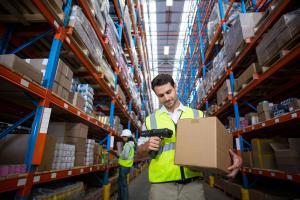 In light of the COVID-19 pandemic, it’s now more important than ever for supply chain and logistics management businesses to transition to digital operations. Digital logistics are far from simply being the wave of the future; they have the potential to elevate your current supply chain operations to otherwise unparalleled levels. There are a lot of important benefits to moving to a digital supply chain platform, not just in the age of COVID-19, but for the overall future of the logistics management industry.
In light of the COVID-19 pandemic, it’s now more important than ever for supply chain and logistics management businesses to transition to digital operations. Digital logistics are far from simply being the wave of the future; they have the potential to elevate your current supply chain operations to otherwise unparalleled levels. There are a lot of important benefits to moving to a digital supply chain platform, not just in the age of COVID-19, but for the overall future of the logistics management industry.
Digital logistics means improved analytics, streamlined production processes, greater shipping, receiving, and warehousing efficiency, easier communication across various departments, and above all, opportunities to identify potential production delays and problems as soon as they happen.
Here are a few reasons why you should consider transitioning your supply chain to a digital logistics platform for the future.
Digital Transformation-Derived Flexibility
One of the main benefits of switching to a digital platform for your business’s supply chain is that it allows you to engage in a much more flexible method of tracking production processes, inventory, shipments, and customer deliveries. By streamlining these processes, you can also increase production and delivery efficiency significantly which allows you to better serve your customers and provide them with up-to-the-minute information as requested.
The supply chain is constantly bombarded with an endless barrage of previously unprecedented challenges including pandemic-induced border closures, diplomatic issues between countries, and even natural disasters. There’s no shortage of potential problems—both manmade and natural—that can prevent you from getting your products to their intended destinations. A digital platform gives you the advanced tools you need to not only educate yourself about these potential issues a lot faster, but to also streamline viable solutions for these problems and be better prepared for them in the future.
The Growth of Mergers and Acquisitions (M&A)
As a direct result of this pandemic, the global economy will see an inimitable rise in mergers and acquisitions between companies. Small- and medium-sized businesses with moderate to large supply chains will inevitably struggle to survive the financial hardships brought on by the pandemic-driven closures and their aftermaths around the world. Of course, the extent of these closures varies largely based on each country’s individual response to the pandemic as well as the efficacy of those responses.
Many European and Asian countries are well on their way to getting things back to normal and slowly rebuilding their economies. Unfortunately, the same can’t be said for North American countries like the United States, which is one of the largest product importers and exporters in the world.
Since there are strict restrictions on international trade and product imports and exports, it’s estimated that many small- and medium-sized businesses will be acquired by larger enterprises. In some cases this can be a good thing as it allows struggling logistics management teams to recoup some of their losses and move on to other endeavours. But it can also be a bad thing for some supply chain businesses because there are a lot of predatory companies that are looking to poach small companies with digital platforms for a minimal cost and a pandemic is the perfect opportunity for that.
If you plan on merging with another company or selling your business, there are a lot of potential gains provided that you make the right call. On the plus side, it can pay off to have a more experienced entity in charge of managing the more complex aspects of your business, which gives you the opportunity to focus more on the day-to-day operations.
How the Pandemic Has Impacted the Growth of Artificial Intelligence
Artificial intelligence has been on the rise in the supply chain industry for a number of decades. In fact, the presence of automated mechanisms used to streamline various processes is nothing new. With the COVID-19 pandemic still in full swing and many workers wary about returning to their jobs, it makes sense that a lot of supply chain companies need to find innovative ways to fill in those gaps or else risk major financial losses.
Local grocery stores, discount stores, retail establishments, restaurants, and office supply depots all rely on fast, efficient supply chain operations to get their products out on the shelves, in warehouses, and in the hands of their customers. Production delays don’t just cost supply chains a lot of money; they also negatively impact the businesses that rely on timely product availability and deliveries. Otherwise, these businesses risk customer dissatisfaction and massive financial losses.
Integrating more artificially intelligent processes in the logistics management industry can help streamline production and delivery processes in a safe, health-conscious, and completely contactless way without completely eliminating the human element. Automation allows logistics workers and managements to still manage their operations from a safe distance using innovative and secure digital platforms and networks that are connected and can communicate with one another. COVID-19 may not have introduced the need for automation in the supply chain industry, but it has certainly perpetuated the notion that this is a much better way of doing things.
Increased Human and AI Interactions
It could be argued that COVID-19 is also changing the way that humans in the supply chain industry are interacting with artificially intelligent mechanisms. On a global level, automation and AI are taking on more of an active role in the logistics and supply chain industry. Human-based artificial intelligence is making big waves in the technological world and it’s especially important in light of urgent situations such as the COVID-19 pandemic.
What this means is that for the majority of the time, automated mechanisms will have full control over production line and supply chain outputs. However in times of emergency, human intervention and decision-making skills will take over and be implemented. This helps maintain a very strong humanistic element to an otherwise mostly automated process.
The Role of Lean Supply Solutions in Digital Logistics
Lean Supply Solutions is a privately owned corporation with a focus on providing innovative solutions for a large and diverse base of multinational, regional, and local companies. We also provide forward-looking end-to-end control logistics capabilities, customized technical services, IT solutions, 4PL, and consulting services by supporting major OEM assembly operations and tier-one facilities. To learn more about our digital logistics solutions, please feel free to contact us today!


